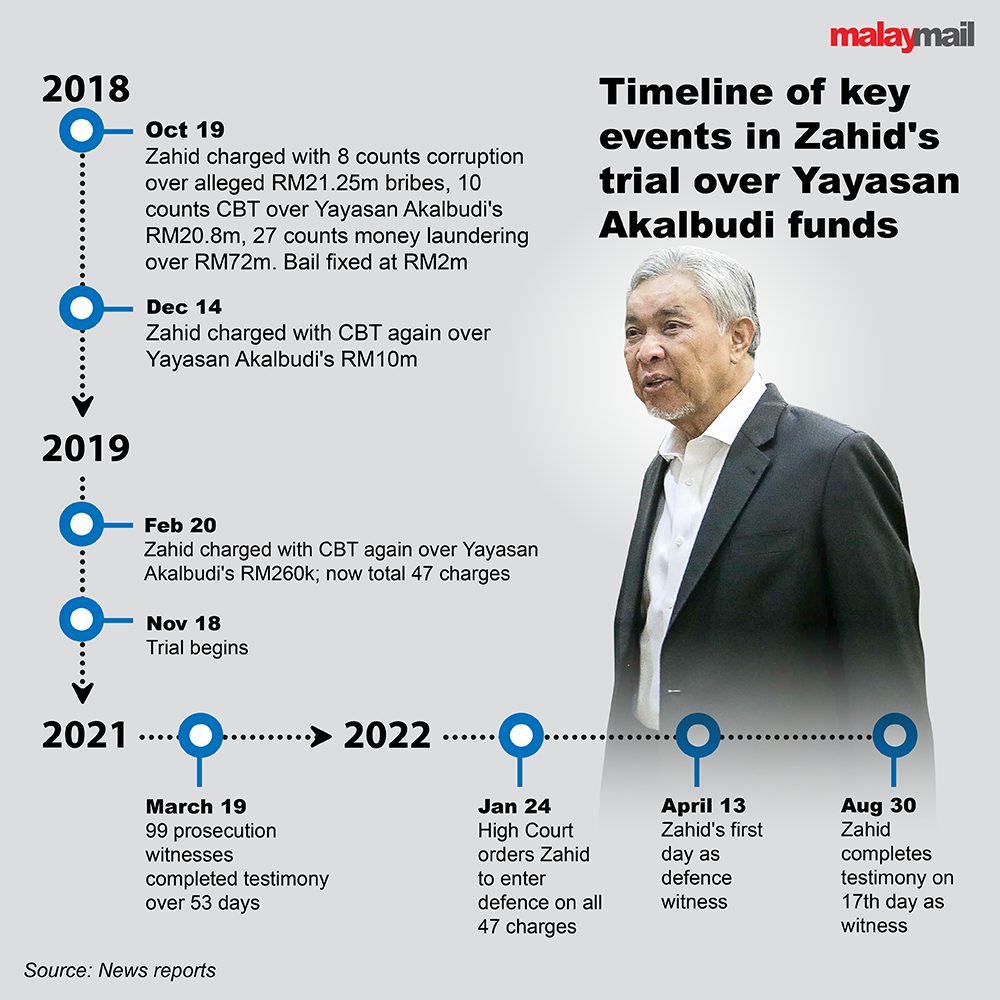KUALA LUMPUR, Sept 5 — PKR MP Wong Chen today said Deputy Prime Minister Datuk Seri Ahmad Zahid Hamidi’s Yayasan Akalbudi court case — from which the latter was discharged yesterday without being acquitted — illustrates the need for Malaysia to carry out reforms by splitting up the attorney general’s (AG) dual functions.
Wong said he had received many comments and messages on Zahid’s case and responded by saying that institutional reforms are needed.
“This episode only strengthens the urgent need for fundamental reforms. Defence lawyers of Zahid have claimed the undue influence of Mahathir in initiating the case. Others have different views on where the undue influence has happened,” the Subang MP said on the social media site X, formerly known as Twitter.
Yesterday, Zahid’s lawyers reiterated Zahid’s claim during the Yayasan Akalbudi trial that his case was caused by alleged “political prosecution”, and also repeated Zahid’s testimony in court that he had refused to comply with then prime minister Tun Dr Mahathir Mohamad’s alleged request in a purported June 2018 meeting to dissolve Umno and that the Malaysian Anti-Corruption Commission (MACC) had probed him in July 2018 and that he was charged in October 2018.
Today, Wong said the bottom line is that reforms need to be carried out by passing laws in Parliament to enable the country’s independent bodies such as the MACC and AG to “function without political influence”.
Currently, the attorney general has the dual roles under the Federal Constitution of advising the Yang di-Pertuan Agong, the Cabinet or any minister on legal matters; and holds the powers to use his discretion to initiate, conduct or discontinue any court proceedings for any offences.
Wong said the AG’s double roles should be divided up between the AG and the solicitor general instead.
“In particular, the AG and solicitor general offices need to be separated, with the AG functioning as chief advisor to the government on commercial, civil and international trade matters.
“Whereas the solicitor general runs an independent public prosecution body, accountable only to Parliament,” he said.
“As for the MACC, senior appointments must be vetted by Parliament and all its activities accountable to Parliament. These two reforms are fundamental,” he said.
Wong said Malaysia needs to “get moving fast on these reforms and pass the necessary laws within the next 12 months.”
“As a government MP, I will continue to urge and push harder my government to make good these reforms.
“When these laws are in place, then perhaps we will see the start of the end of undue influence of politics in anti-corruption matters,” he concluded.
After Zahid’s multiple attempts via representation letters to the AG to seek for a review of all the 47 charges he was facing in the Yayasan Akalbudi trial, Zahid’s lawyers had in an August 24 joint statement urged the AG to speed up his decision on Zahid’s application to have all 47 charges reviewed and had also claimed Zahid’s prosecution was due to his alleged refusal to dissolve Umno.
The High Court was initially scheduled to continue hearing Zahid’s trial yesterday, but the prosecution informed the court that it wanted to discontinue the trial against Zahid in line with the AG’s powers under Article 145 of the Federal Constitution and Section 254 of the Criminal Procedure Code.
The prosecution applied for a discharge not amounting to an acquittal (DNAA) based on at least 11 reasons including to enable more comprehensive and complete investigations to be carried out on Zahid’s case, while Zahid’s lead defence lawyer Datuk Hisyam Teh Poh Teik had argued that Zahid should be fully acquitted without the possibility of being charged with the same charges hanging over his head.
Judge Datuk Collin Lawrence Sequerah then decided to grant a DNAA for Zahid’s case instead of acquitting him, which means Zahid has been released of the 47 charges for now but could still be prosecuted with the same charges again in the future if the prosecution decides to do so.




















